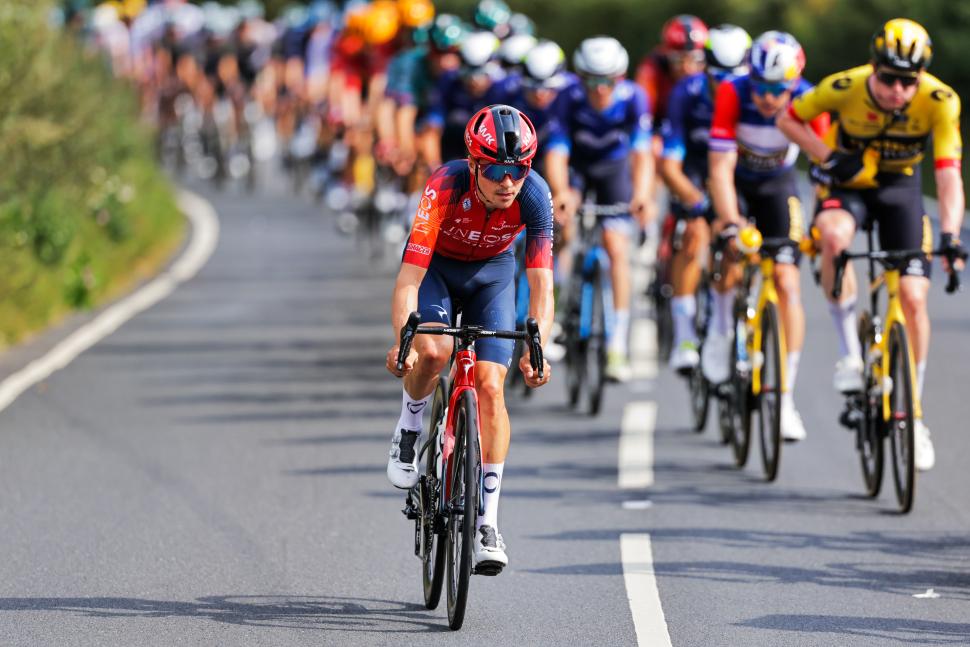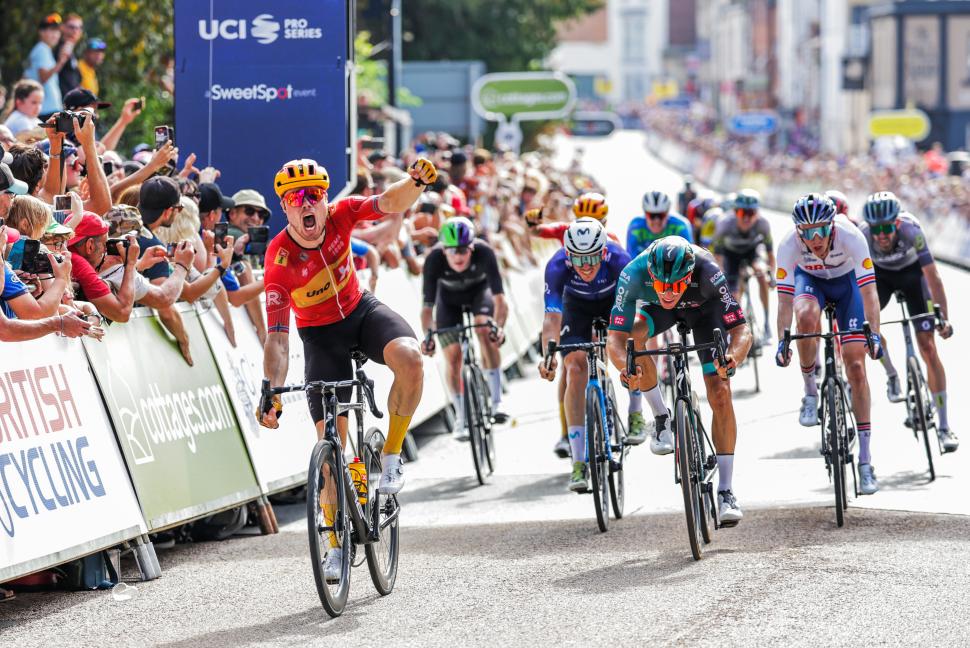- News
- Reviews
- Bikes
- Components
- Bar tape & grips
- Bottom brackets
- Brake & gear cables
- Brake & STI levers
- Brake pads & spares
- Brakes
- Cassettes & freewheels
- Chains
- Chainsets & chainrings
- Derailleurs - front
- Derailleurs - rear
- Forks
- Gear levers & shifters
- Groupsets
- Handlebars & extensions
- Headsets
- Hubs
- Inner tubes
- Pedals
- Quick releases & skewers
- Saddles
- Seatposts
- Stems
- Wheels
- Tyres
- Tubeless valves
- Accessories
- Accessories - misc
- Computer mounts
- Bags
- Bar ends
- Bike bags & cases
- Bottle cages
- Bottles
- Cameras
- Car racks
- Child seats
- Computers
- Glasses
- GPS units
- Helmets
- Lights - front
- Lights - rear
- Lights - sets
- Locks
- Mirrors
- Mudguards
- Racks
- Pumps & CO2 inflators
- Puncture kits
- Reflectives
- Smart watches
- Stands and racks
- Trailers
- Clothing
- Health, fitness and nutrition
- Tools and workshop
- Miscellaneous
- Buyers Guides
- Features
- Forum
- Recommends
- Podcast
news
 Tom Pidcock, 2023 Tour of Britain (Alex Whitehead/SWpix.com)
Tom Pidcock, 2023 Tour of Britain (Alex Whitehead/SWpix.com)“I’ve got three balls, anyone need a spare?” Tom Pidcock laments Tour of Britain abandon due to infected saddle sore
As the Tour of Britain finally exploded into life on the roads of Gloucestershire this afternoon, after six days of relatively flat, sedate, though nevertheless debate-provoking racing and seemingly nailed-on sprints, one pre-race favourite was notably missing from the long-awaited action. Tom Pidcock, who was expected to challenge race leader Wout van Aert for the overall title during the final crucial two stages, was forced to withdraw from the Tour this morning due to a saddle sore infection.
The bane of the pro peloton, the worsening bout of saddle sores means that the 24-year-old Ineos Grenadiers rider has once again failed to make it to the Tour of Britain’s final weekend, after the death of Queen Elizabeth II brought an abrupt end to last year’s race following stage five, with the Yorkshireman poised in second place, just three seconds behind Movistar’s Gonzalo Serrano.
At this year’s race – the multi-disciplinary Pidcock’s first on the road since the Tour de France in July, after spending most of August on his mountain bike, winning the world cross country title in Scotland in the process – the 24-year-old navigated the bunch gallops and somewhat uneventful racing of the first six days to sit in fifth, three seconds off Van Aert’s lead.
Pidcock winces his way through yesterday’s stage to Harlow (Alex Whitehead/SWpix.com)
However, like many riders before him, a saddle sore infection has brought an untimely end to his stint racing on home roads.
“Tom is disappointed not to finish his home race, but unfortunately the condition has gradually worsened over the week and the medical team has advised race withdrawal to focus on recovery,” a statement issued by Ineos read this morning.
As the attacks kicked off on the run-in to Gloucester this afternoon, Pidcock himself took to social media to reflect on his premature exit, of which he at least managed to see the funny side.
“I’ve got three balls, anyone need a spare?” he cheekily posted on Instagram.
“Seriously though, not starting today at the Tour of Britain is hard. A saddle sore got infected and it’s too painful to sit down. The boys did a great job all week keeping me safe [and] ready for a big GC fight this weekend.
“Good luck to the boys, I’ll be back to get past stage six!”
The 2023 Strade Bianche winner and multiple world champion isn’t the only up-and-coming prospect suffering with saddle sores this month.
Bora-Hansgrohe’s prodigious young Belgian Cian Uijtdebroeks has been one of the revelations of the Vuelta a España, climbing with the very best to firmly ensconce himself within the top ten as the Spanish grand tour enters its final week.
But the 20-year-old’s breakout ride is made arguably all the more impressive as a result of the persistent saddle sore he’s been forced to endure on the roads of Spain over the past two weeks (a sensation with which Irish legend Sean Kelly, forced to quit the 1987 Vuelta with an extremely painful saddle sore while on the cusp of winning the race, can relate all too closely).
(Alex Whitehead/SWpix.com)
Meanwhile, with Pidcock relegated to the role of spectator, the Tour of Britain finally got the action it had been craving this afternoon between Tewkesbury and Gloucester. A hilly and relentlessly-raced opening section saw Pidcock’s Ineos teammate Ben Turner and Q36.5’s Mark Donovan forge clear, before being joined by Ryan Christensen of Bolton Equities Black Spoke, Trinity’s Liam Johnston, and Abram Stockman (TDT-Unibet Cycling Team).
With the bunch slowly whittling down throughout the stage, Turner and Donovan were able to latch on when the inevitable Wout van Aert attack occurred with 12km to go. Israel-Premier Tech’s Stephen Williams then proved he had the strength to bridge across to the leading trio, before a small six-rider group containing defending champion Serrano and the Bora-Hansgrohe duo Danny van Poppel and Nils Politt found their way back on during a chaotic and fluid finale.
With around four kilometres to go, as the two leading groups looked on the verge of coalescing, Jumbo-Visma’s Van Aert launched yet another solo attack. However, the combined impetus of Bora and Uno X ensured that the persistent race leader was hauled back in with under 600 metres to go, and it was those two teams that duly fought it out for the stage win, Rasmus Tiller seeing off yesterday’s victor Danny van Poppel in the 12-man sprint to the line.
2021 Tour of Britain winner Van Aert, meanwhile, watched the spectacle unfold from the back of the group, safe in the knowledge that he will take his three-second advantage to the foot of Caerphilly Mountain tomorrow afternoon for the race’s denouement – where, the organisers tell us, the dampened sparklers of the first six days will give way to a firework spectacular.
After obtaining a PhD, lecturing, and hosting a history podcast at Queen’s University Belfast, Ryan joined road.cc in December 2021 and since then has kept the site’s readers and listeners informed and enthralled (well at least occasionally) on news, the live blog, and the road.cc Podcast. After boarding a wrong bus at the world championships and ruining a good pair of jeans at the cyclocross, he now serves as road.cc’s senior news writer. Before his foray into cycling journalism, he wallowed in the equally pitiless world of academia, where he wrote a book about Victorian politics and droned on about cycling and bikes to classes of bored students (while taking every chance he could get to talk about cycling in print or on the radio). He can be found riding his bike very slowly around the narrow, scenic country lanes of Co. Down.
Latest Comments
- bmxboyx01 40 min 48 sec ago
It has to be an organised group. My mate had his Canyon gravel bike with every single upgrade going on it. So many go each year, but the sleepy...
- chrisonabike 1 hour 31 min ago
Think this line of argument * is almost a default and not just for collisions involving cyclists. e.g. "They ran into me ergo it's their fault"....
- Rapha Nadal 1 hour 56 min ago
I think I'm just going to go down half a size which should fix it.
- Rendel Harris 2 hours 32 min ago
No mention of the cost...at $1449 I think I'll stick to the old "I feel a bit thirsty, better have a drink" system.
- ChrisA 2 hours 41 min ago
One bike seized? I'm sure there were four of them. ‐‐---- Quote "E-bike riders caught using police drone" Did the steal the drone, as well?
- ChrisA 2 hours 52 min ago
Mirror advised.
- BikingBud 4 hours 3 min ago
Yup - Rivermind! ****SPOILER ALERT***** https://www.radiotimes.com/tv/sci-fi/black-mirror-common-people-ending-e...
- lesterama 5 hours 5 min ago
A friend told me that Gravaa doesn't work with inserts. Visma actually glued their tubeless tyres on to avoid tyre detachments! Sounds like a...
- Velophaart_95 5 hours 24 min ago
That was my first thought when I saw, and read it........


Add new comment
6 comments
One correction to your article, it should say Queen Elizabeth II of England
As opposed to what, the ocean liner?
https://en.wikipedia.org/wiki/Elizabeth_II_(disambiguation)
Presumably as opposed to the unrelated Queen Elizabeth of Canada, or Jamaica, or Papua New Guinea, or St. Kitts and Neavis, or... ?
I would imagine as opposed to Queen Elizabeth I of Scotland - as Scotland was never ruled by Elizabeth I of England, some Scots object to calling her Elizabeth II (in much the same way that James II of England is also known as James VII of Scotland - although of course he predates the Acts of Union).
Of course much of the rest of the Commonwealth was never ruled by Elizabeth I either, but had no issue calling her Elizabeth II. Only the Scots insisted on kicking up a fuss...
Technically the United Kingdom did not exist until the Union with Ireland in 1801, so George III should have been George I, his son George II, William III William I, Edward VII Edward I and so on and so forth. But I think most people would think that would be a bit silly.
God knows I'm no monarchist but she was Queen Elizabeth II of the United Kingdom, just as the current incumbent is Charles III even though the first two Charlies came before the Act of Union.